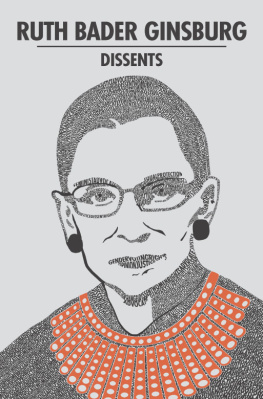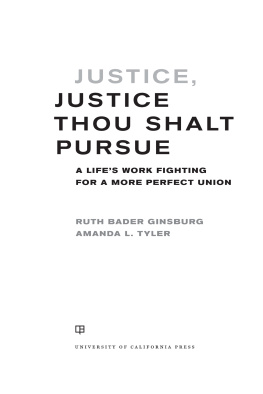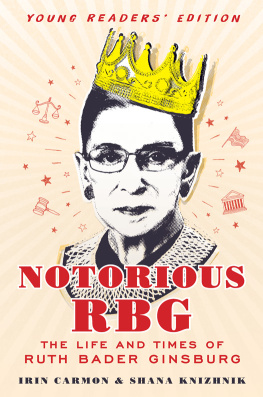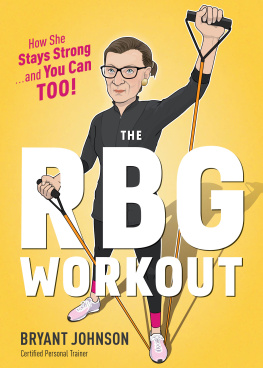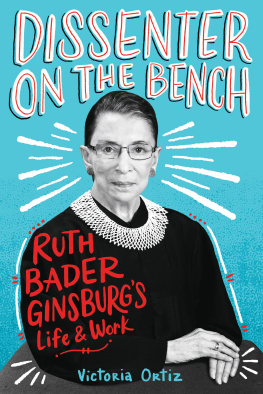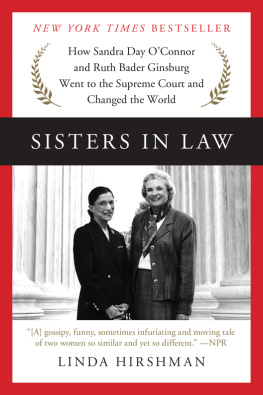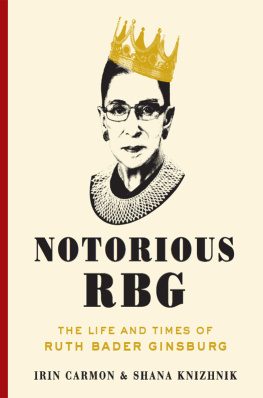Justice Ginsburg speaks at the Conference of Court Public Information Officers in the West Conference Room at the Supreme Court on August 8, 2011.
Thank you for downloading this Simon & Schuster eBook.
Join our mailing list and get updates on new releases, deals, bonus content and other great books from Simon & Schuster.
C LICK H ERE T O S IGN U P
or visit us online to sign up at
eBookNews.SimonandSchuster.com
Contents

To Marty, dear partner in life and constant uplifter
A Note on Sources
M Y O WN W ORDS includes a variety of materials, including speeches that have no citations, and legal briefs and law review articles that are rife with citations. Our publisher recommended that instead of including the full citations in the print edition of the book, it would benefit the environment and most of our readers to instead house the majority of the legal citations from briefs and articles on the books website MyOwnWordsBook.com. We have retained notes from the introductory text and the Scalia/Ginsburg opera excerpt in the print edition.
Preface

M AY I TELL YOU, good readers, how this book came to be. In the summer of 2003, Wendy Williams and Mary Hartnett visited me in chambers. They had a proposal: People will write about you, like it or not. We suggest that you name as your official biographers authors you trust. The two of us volunteer for that assignment. Wendy and I were in the same line of business in the 1970s. We were engaged in moving the law in the direction of recognizing womens equal-citizenship stature. Wendy was a founder of the San Franciscobased Equal Rights Advocates. I was on the opposite coast as cofounder of the American Civil Liberties Unions Womens Rights Project. We understood and aided each others public education, legislative, and litigation efforts. Wendy and I remained in close touch when she joined the faculty of Georgetown University Law Center. Mary was an adjunct professor at the Law Center, and director of the centers Womens Law and Public Policy Fellowship Program. Well traveled, wise, and what the French call sympathique , Mary seemed to me a fit partner for Wendy in the biographical venture. Without hesitation, I said yes to their proposal.
My Own Words would follow after publication of the biography, we anticipated. But as my years on the Court mounted, Wendy and Mary thought it best to defer final composition of the biography until my Court years neared completion. So we flipped the projected publication order, releasing first the collection now in your hands.
How fortunate I was to be alive and a lawyer when, for the first time in U.S. history, it became possible to urge, successfully, before legislatures and courts, the equal-citizenship stature of women and men as a fundamental constitutional principle. Feminists, caring men among them, had urged just that for generations. Until the late 1960s, however, society was not prepared to heed their plea.
What enabled me to take part in the effort to free our daughters and sons to achieve whatever their talents equipped them to accomplish, with no artificial barriers blocking their way? First, a mother who, by her example, made reading a delight and counseled me constantly to be independent, able to fend for myself, whatever fortune might have in store for me. Second, teachers who influenced or encouraged me in my growing-up years. At Cornell University, professor of European literature Vladimir Nabokov changed the way I read and the
At Harvard Law School, Professor Benjamin Kaplan was my first and favorite teacher. He used the Socratic method in his civil procedure class always to stimulate, never to wound. Kaplan was the model I tried to follow in my own law teaching years, 196380. At Columbia Law School, professor of constitutional law and federal courts Gerald Gunther was determined to place me in a federal court clerkship, despite what was then viewed as a grave impediment: on graduation, I was the mother of a four-year-old child. After heroic efforts, Gunther succeeded in that mission. In later years, litigating cases in or headed to the Supreme Court, I turned to Gunther for aid in dealing with sticky issues, both substantive and procedural. He never failed to help me find the right path.
Another often-asked question when I speak in public: Do you have some good advice you might share with us? Yes, I do. It comes from my savvy mother-in-law, advice she gave me on my wedding day. In every good marriage, she counseled, it helps sometimes to be a little deaf. I have followed that advice assiduously, and not only at home through fifty-six years of a marital partnership nonpareil. I have employed it as well in every workplace, including the Supreme Court of the United States. When a thoughtless or unkind word is spoken, best tune out. Reacting in anger or annoyance will not advance ones ability to persuade.
Advice from my father-in-law has also served me well. He gave it during my gap years, 195456, when husband Marty was fulfilling his obligation to the Army as an artillery officer at Fort Sill, Oklahoma. By the end of 1954, my pregnancy was confirmed. We looked forward to becoming three in July 1955, but I worried about starting law school the next year with an infant to care for. Fathers advice: Ruth, if you dont want to start law school, you have a good reason to resist the undertaking. No one will think the less of you if you make that choice. But if you really want to study law, you will stop worrying and find a way to manage child and school. And so Marty and I did, by engaging a nanny on school days from 8:00 a.m. until 4:00 p.m. Many times after, when the road was rocky, I thought back to Fathers wisdom, spent no time fretting, and found a way to do what I thought important to get done.
Work-life balance was a term not yet coined in the years my children were young; it is aptly descriptive of the time distribution I experienced. My success in law school, I have no doubt, was due in large measure to baby Jane. I attended classes and studied diligently until four in the afternoon; the next hours were Janes time, spent at the park, playing silly games or singing funny songs, reading picture books and A. A. Milne poems, and bathing and feeding her. After Janes bedtime, I returned to the law books with renewed will. Each part of my life provided respite from the other and gave me a sense of proportion that classmates trained only on law studies lacked.
I have had more than a little bit of luck in life, but nothing equals in magnitude my marriage to Martin D. Ginsburg. I do not have words adequate to describe my supersmart, exuberant, ever-loving spouse. He speaks for himself in two selections chosen for this book.
Marty coached me through the birth of our son, he was the first reader and critic of articles, speeches, and briefs I drafted, and he was at my side constantly, in and out of the hospital, during two long bouts with cancer. And I betray no secret in reporting that, without him, I would not have gained a seat on the U.S. Supreme Court. ThenAssociate White House Counsel Ron Klain said of my 1993 nomination: I would say definitely and for the record, though Ruth Bader Ginsburg should have been picked for the Supreme Court anyway, she would not have been picked for the Supreme Court if her husband had not done everything he did to make it happen.


